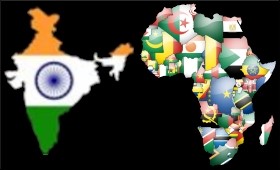CII-WTO Report 2013-08-12
 Geneva 9th July: India-Africa bilateral trade and investment increased exponentially, yet it is far away from the true potential. According to the joint CII-WTO report “India-Africa: South-South Trade and Investment for Development” lack of financing and poor infrastructure facilities are the two key constraints in India-Africa bilateral trade and investment. The report was released today by Mr. Sunil Kant Munjal, Past President, CII, on the margins of 4th WTO Global Review of Aid for Trade event, held at WTO headquarters in Geneva.
Geneva 9th July: India-Africa bilateral trade and investment increased exponentially, yet it is far away from the true potential. According to the joint CII-WTO report “India-Africa: South-South Trade and Investment for Development” lack of financing and poor infrastructure facilities are the two key constraints in India-Africa bilateral trade and investment. The report was released today by Mr. Sunil Kant Munjal, Past President, CII, on the margins of 4th WTO Global Review of Aid for Trade event, held at WTO headquarters in Geneva.
A panel discussion comprising of senior international diplomats and private sector members from Africa and India was organised to discuss the key findings of the report. While speaking on the findings of the report, Mr. Munjal emphasised that Africa is not one single market and therefore, India needs to adopt an individual country specific strategy to promote bilateral trade and investment.
The other panelists included HE Dr. Anthony Mothae Maruping, Commissioner for Economic Affairs, African Union; Dr. Willaim Kalema, Chairman, Uganda Manufacturers Association; and Mr. Eamon Cassidy, Senior Economist, Trade Policy Unit, DFID, UK. The panelists were of the view that though India has its own infrastructure deficiencies but it can play a big role in building the infrastructure in African countries.
-
This survey based report was done by CII in collaboration with the Development Division of the WTO and with the support of UK Department for International Development. To understand the dynamics of this vibrant relationship, CII surveyed some 60 key Indian and African companies and business associations. Results highlight a number of factors getting in the way of expanded business and investment ties. Access to Indian buyers and trade finance emerges as major concerns for African traders. Transport and logistics costs and poor business environments are cited as major difficulties by Indian traders - a factor also cited as holding back further investment.
-
-
India and Africa together account for a huge market of 2.2bn people with a combined GDP of more than US$3trillion. India-Africa bilateral trade has grown from $1billion in 2001 to around $50billion in 2011-12. At the same time, India’s investments in Africa are estimated to be over $50billion now. The report finds that further expanding India's investment-led trade approach and addressing trade irritants on both sides could help sustain this dynamic trade growth - and help extend it both in terms of the number of partners involved and also the range of goods and services traded.
-
-
The joint CII-WTO report concludes with a series of recommendation on how development assistance and investments in tandem could help smooth out potential bottleneck towards a more sustainable investment-led trade growth relationship between India and Africa.
 Geneva 9th July: India-Africa bilateral trade and investment increased exponentially, yet it is far away from the true potential. According to the joint CII-WTO report “India-Africa: South-South Trade and Investment for Development” lack of financing and poor infrastructure facilities are the two key constraints in India-Africa bilateral trade and investment. The report was released today by Mr. Sunil Kant Munjal, Past President, CII, on the margins of 4th WTO Global Review of Aid for Trade event, held at WTO headquarters in Geneva.
Geneva 9th July: India-Africa bilateral trade and investment increased exponentially, yet it is far away from the true potential. According to the joint CII-WTO report “India-Africa: South-South Trade and Investment for Development” lack of financing and poor infrastructure facilities are the two key constraints in India-Africa bilateral trade and investment. The report was released today by Mr. Sunil Kant Munjal, Past President, CII, on the margins of 4th WTO Global Review of Aid for Trade event, held at WTO headquarters in Geneva.